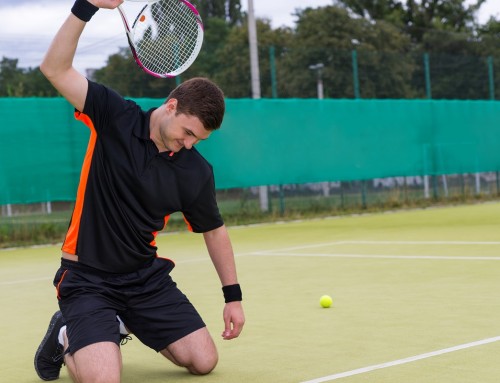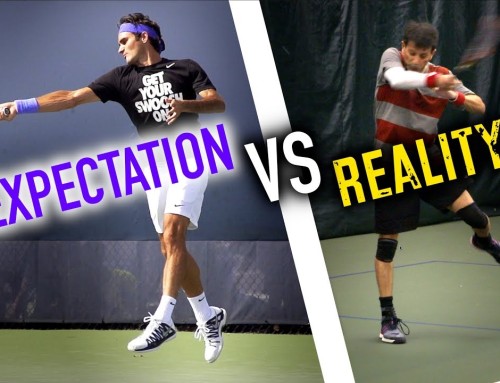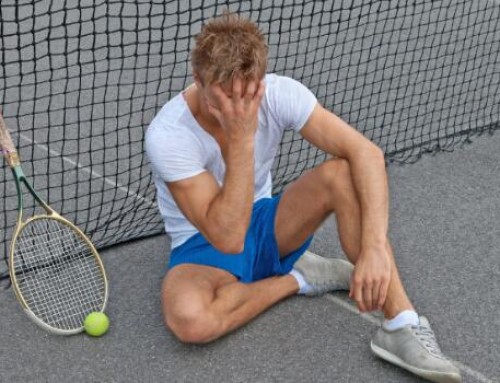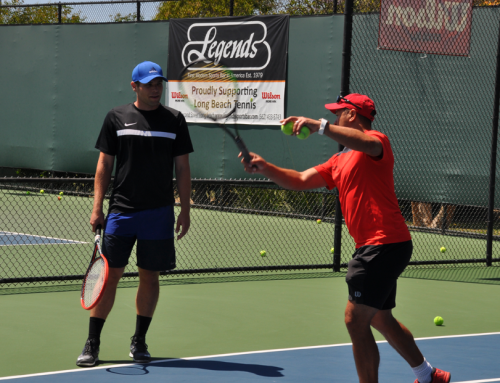On today’s show Ian answers a great question about developing the skills needed to win. We’re not talking about forehand or backhand technique but rather the intangibles that really make up a player that just seems to pull out wins even against “better” players. Ian also discusses a question about what parts of your technique you should be thinking about and which should just be “automatic”!
Download Transcript: Word Doc | PDF | Kindle | Text
Welcome to the Essential Tennis Podcast.
If you love tennis and want to improve your game, this podcast is for you. Whether it’s technique, strategy, equipment or the mental game, tennis professional Ian Westermann is here to make you a better player.
Now, here’s Ian.
Hi and welcome to the Essential Tennis Podcast. Your place for free, experts, Tennis instructions that can truly help you improve your game. Today’s episode of the podcast Is brought to you by Tennis Express and Tennis Tutors.
Thank you very much for joining me on today’s episode. I can’t wait to get to our topics on today’s show. Our new topics, yes, I am recording a new show today. Before I get to that, I want to let you all know about the next Essential Tennis clinics. I’ve done clinics all around the country now for listeners of the podcast and fans of Essential Tennis in general. I really love doing them because it’s so great to work In person with people that are fans of the sites. They are players that’s always worked really hard, are great listeners and I just feel like a lot is always accomplished at these weekend events.
The next one is going to be in New York City, April 16th and 17th; a ctually in the city. I don’t have full details and sign up available yet on the website, I am working on that. I am going to have full details available next week but if you want to email me in the mean time and kind of get yourself on the list right away, you can do that. There’s only going to be seven spots available for this clinic. If you’re in New York City or in the New York City area, please shoot me an email at Ian@essentialtennis.com and I can give you more information as it becomes available. Let’s go ahead and get to today’s shows. Sit back, relax and get ready for some great tennis instruction.
Alright, our first topic on today’s show is coming to us from Andrew S in Chattanooga, TN. He wrote to me and said: I am a 3.0 player and with the exception of my server, I have the foods of being a 3.5. When I am hitting with my 3.5 friends, I do great. I can hit good shots from all part of the court but when it comes to match play, I have a really tough time winning. Even against a weaker 3.0 player, I loose and sometimes, very badly.
I’ve played basketball since I could walk and can beat guys that are much more skilled than I am. I guess in basketball, I just know how to win. I get so frustrated when I play tennis and loose to a player I feel I have competitive advantage over. To sum it all up, I guess I just need to learn how to win in tennis. Do you have any tips in helping me raise my tennis IQ. Thanks a ton, Andrew.
Andrew, that’s an excellent question. Basically, what you are looking for, is the most essential elements to being able to go out there and just win. There’s a lot to be said for what you are describing; being able to be a player who is more “skilled” than you are is definitely possible and everybody listening that has much experience in competing in tennis, knows exactly what Andrew is talking about. We have all lost to that player that has ugly strokes, doesn’t look look he or she is real a good player in general but for whatever reasons, just knows how to win.
So, what are those elements that kind of make up for that, that lack of skill? What are the elements that really are…can explain the ability to just know how to win in tennis?
Andrew here, I assumed is looking for singles, specific advice, which is what I am going to give him today. We are going to break this down, pretty quickly, into three main areas that I feel that you really need to understand the most, Andrew, and you need to develop and be aware of the most, to be able to have that…. kind of inherent ability to just know how to win matches, even if you are not the most skilled person on the court.
We are going to break this into three areas. The first one has to do with Consistency. At most levels of tennis, c onsistency is king. You need To really understand that fully, e specially around your level. Once you start getting up into stronger 4.0, 4.5, d efinitely stronger 4.5 or 5.0 player, you need to have some weapons for sure. Once you get up into those ranges of ability levels because if you don’t, they will, most likely. At a 5.0 level, you are not going to play many players whose main skill or main way of winning, is just putting the ball in courts. They are going to have some way of hurting you and someway of having offense, to be able to put the ball away. But at a 3.0 level or 3.5 level for sure, consistency is really the foundational skill you need to develop now, It’s what you are going to build the rest of your game on top of as you can to develop and continue to move up in level and so, you have to learn consistency now.
If you don’t, if you are not able to just put the ball in court reliably now, and you instead work on weapons, expressive shots and ways to just finish playing and put the ball away, you are going to very one dimensional and you are going to have a very hard time beating players that are smarter than you or have a higher tennis IQ, than you do, as you put it. It’s incredibly cliche but as I already said in tennis, the last person to make a shot wins. Whoever puts the ball in the court last, wins the points. That’s the case for the match as well. Whoever put the ball in the court last in the match, Is the winning player. I am not going to go into detail in technique but you need to learn solid fundamental technique and you need to repeat it enough times that you can reliably do it at a moment’s notice and to be able to just make a forehand, make a backhand and just make your serve, etc, etc. So, you need to develop your consistency.
A motto that I am consistently repeating to myself when I compete at my level of play is make him play, make him play. This is something that I especially repeat when I am returning serve. When I have a break chance, which is big at a 5.0 level, being able to break your opponent’s serve. I repeat myself again and again as I am getting ready to receive that serve, “make him play, “make him play, make him play.” I want to make sure that, even if I don’t hit a really big impressive, you know, something that you would consider a 5.0 level return of serve, even if it’s not that, I want to be absolutely certain that I make him hit some kind of shot, because the pressure is on that player.
If you can go through an entire match that way, and just make your opponent play consistently. Every single point, make him play, make him do something, you are going to find yourself winning more points and more matches. So that’s number one, consistency. I am not going to get anymore specific than that right now.
Number 2: U nderstanding the percentages and play them almost exclusively. This is a topic I am not going to get into a lot of detail on either because I have in previous shows, but understand that from the base line, most of your shots should be going cross courts, most of the times. There are exceptions to t hat but majority of the time, you should be aiming cross court because it is a higher percentage shot, It makes your opponent move more because you are hitting at an angle and that’s all I am going to say about that. Follows the directionals. The directionals don’t say you should always hit across but the majority of the time, that’s where you should be aiming, it’s cross-court from the baseline. When you approach the net, the vast majority of the time, you should be aiming down the line.
Honestly, if you just follow those two rules; if you hit the majority of the baseline shot cross court, the majority of your approach shots down the line and you make a high percentage of your serve and a high percentage of your returns, you are going to be really hard to beat.
Honestly, if you just do those four simple things, and I don’t mean to say simple like it’s easy to do b ut it’s simple in terms of concept. Conceptually, it’s a very simple thing, t hings you can really work on. They are tangible things you can developed and practice and really focus on doing match break that are very, very directly related to your success. Now, if you like more in-dept information on why you approach the down line and why you should hit most shots cross court, listen to Podcast 156 and 157 and there’s more, there’s many more Podcast as well that covers these topics. You can look at our archives at Essentialtennis.com/ podcast and I think there’s a category just for singles tactics, yeah, there is. So you can look under that category. There’s going to be hours of contents there about those topics. That’s number 2, understanding the percentages and playing them almost exclusively.
Number 3: The third part that’s really essential as far as raising your IQ is being mentally and tactically ruthless. Something tells me that since you have a lot of experience already playing other sports; basketball is the one that you mentioned, you probably know exactly what I am talking about and this is something you absolutely do when you do play basketball. But I have a couple of specifics here that you should keep in mind and things that you should continue to work on.
First of all, find out and you want to do this as early as possible, any match you play, find out what your opponent doesn’t like. Find out what makes them frustrated on the courts a nd then make them do it again and again and again and again. I might sound mean, especially to those of you out there who have a little bit more of a compassionate personality, but If you really want to win, what it comes down to, largely, is finding out what your opponent doesn’t like and make them do it over and over and over again. That will make you successful. It’s not that you’re doing it because you don’t Like them, because they’re your enemy and your trying to make them angry.
But to be totally honest, If you do this, it’s very likely It’s possibly will make them angry at the end of the day. You’re simply doing it because you are a good competitor. You want to win, that’s the point of competition is doing whatever you can to win, within the rules and within what’s socially acceptable. I am not talking about gamesmans hip here, I am talking about legitimate tactics that you can use to be as successful as possible. Probably the most important one is where I just talked about. Find what they don’t like, make them do it It over and over again.
Number 2, under being mentally and tactically ruthless, know your strengths and use them as often as possible. You mentioned that you don’t like your serve a whole lot Andrew, I don’t know what your strengths are, specifically you don’t mention them. Maybe it’s your vice, m aybe it’s your forehand, maybe it’s your backhand, I don’t know but you need to be aware of what that is and then go out of your way to use it as often as possible. If you just take these first two suggestions that I have and really implement them as much as you can, you will be successful at the recreational level of playing tennis. Exploiting their weaknesses, over and over and using your strengths over and over. If you do those two things, you are going to be very successful.
Thirdly, be aware of the result base and emotional momentum. When I say result base, I mean who is winning the points. There are always momentum swings back and forth during matches where maybe you’ll win two, three, four points in a row or maybe you’ll go in a run of winning five out of seven points, In a set of points or maybe vice-versa. You need to be aware of that. You also need to be aware of emotional momentum. I mentioned just a second ago, your opponent getting frustrated, getting angry. You need to be aware of when you have the momentum. Both in terms of who is winning the points and also in terms of emotional stability. A mental stability. If you feel, if you sense that you are gaining momentum, you are in a roll, you’re winning points, your opponent is getting frustrated with themselves, they are getting upset, they don’t feel like they are playing well, you need to be very aware of that and then crush them. Know when it is happening and that’s when you really bare down mentally and you’re as focus, as sharp as possible and you just put the screws to them.
You pressure them as much as you can. That’s when you are the most focus and you really make sure that you’re using your strength. You really make sure that you’re going to their weakness and you just make sure that you put them away. And it’s really, really important to be aware of those momentum swings and to be able to take advantage of them. Know when it’s really, really important in a match to really be playing your best and really be the most focus and have the most concentration.
So Andrew, there you go. There’s my quick outline for raising your tennis IQ. Just a brief overview. Number 1 was consistency is king. You have to be consistent. That’s where your foundation should be.
Number 2: Understand the percentages and play them almost exclusively. Baseline shots; mostly cross court, approach shots; mostly down the line. Make sure you listen to previous podcast episodes to get full description on that. And then number 3, be mentally and tactically ruthless. Find out what they don’t like, know what they don’t like and know what your biggest strengths are and then be mindful of momentum shifts and when you have the chance, crush them and put them away. Make sure that you win the match.
Andrew, there you go. Hopefully, that’s helpful to you. I think those are really the most important parts of being successful. Especially, right around your level at 3.0, 3.5 type level. T hat being said, all of these things absolutely applied to the rest of you that maybe higher in levels as well. They’re really, really important things.
Andrew, thanks so much for being a listener, thanks for your question. Hopefully, this is helpful to you and let me know how you continue to progress with your tennis endeavors. Thanks a lot!
Before we get to our second topic of today’s show, I want to real quickly remind you all about the two sponsors of the Essential Podcast.
Number 1: tennistours.com, where you can purchase tickets to just about any major ATP or WTA professional tennis event.
Go check them out and if you make a purchase, use the Promotional code “Essential” to get a discount of your purchase.
Tennis Express, is the second one. That’s where you can go to get all of your gear and equipment needs met. The way you can support the Essential Tennis Podcast through them, is by going to essentialtennis.com/ express. That will re-route you over to Tennis Express automatically and you can make your purchase. A small percentage of that goes back to support The Essential Tennis Podcast. So, tennistours.com and tennisexpress.com, both of those companies, fine institutions I support them and give them my endorsement. They’re both great companies, I know both of the owners, personally and they’ll take good care of you guys. So, definitely check them out.
Okay! With that, let’s get right into our second topic. It comes to us from Blake in Kansas, who’s a 4.0 player. He wrote to me and said; I was thinking an interesting and helpful topic for the Podcast that would be: What parts of Strokes are conscious efforts and what parts just happens naturally. I got this idea when I saw a guy at my club hitting powerful forehands. I complimented him on his forehands and said “you have a great Windshield Wiper motion.” His response was “what’s that?”
What got me thinking, I am sorry, that got me thinking that aspects of the game such as follow through on grounds strokes,
Alright Blake, that’s a real good question. Interesting topic and I’d be happy to Talk about it here. I want to leave my response with the four stages of learning, any physical skill. Some of you may have heard this before. I know I’ve talked about this on the Podcast at some point but it’s been quite awhile. I’ll go through this quickly for those of you who have heard about it already.
The four stages, in again, this is for learning any physical skills. Tennis, Golf, Bowling, Martial Arts, whatever, driving a car; whatever physical skill doesn’t have to be a sport.
The four stages are:
Number 1: Being Unconsciously incompetent. That means that you don’t really have any information in your head about how to do the skill correctly and you’re not good at it. You’re incompetent!
Stage number 2: Consciously Incompetent. Maybe you’ve gone and do some research. You’ve read a website about whatever skill you’re trying to learn, you have some awareness now, but you’re still not good at it; Consciously Incompetent. Consciously Competent. You’re continuing to educate yourself. You got that information, now you’ve been putting in some practice and a certain percentage of the time, you can execute that skill, that physical skill correctly. You’re still aware of it and now you can start to do it correctly.
The last… fourth and final stage,: Is Unconsciously Competent.
That means that you’ve done it enough times correctly but you don’t even have to think about it anymore and you just automatically do it. This is the ultimate. This is what you should be striving for In your tennis strokes. Everything you do in the tennis court, eventually, it should be your goal to do it correctly and without thinking. That’s your ultimate goal. Do it correctly without thinking at all about what you are actually doing. Some of these recreational players, a million thoughts going through their head while they play, which is terrible. This bogs up your head. It makes recreating physical skills like a forehand or a serve usually-physically jerky and tense and just not very efficient. Plus, it distracts you from being aware of important tactical information. If you’re actually competing, if you are thinking about all these different parts of your forehand, or these different parts of your backhand and all of these different parts of your serve, now you’re focus completely on yourself and what you’re trying to do with the racket. Instead of being aware of what’s actually happening in the match and why you might be winning or losing the match. So many recreational matches are lost exactly that way. So, that’s number two.
Number one in my outline was []
Number three is the stages of learning.
Number two, your ultimate goal is to be unconscious and not think about it. Thirdly, you need to understand that every person is at different places with their technique proficiency within different strokes. That’s really Important to understand. Everybody is a little bit different when it comes to their development. We are in a little bit different place. If you’re just beginning your tennis goals, if you’re just beginning your journey through the game of tennis, you may have to be conscious of something on every single stroke. If you’re trying to improve and you’re just learning the basics and you don’t have a lot of athleticism to build on and kind of use to automatically kick start your game. it’s very possible that as you begin to learn, you will have to be conscious of something for every shot you hit. That makes it a lot of work and typically, real frustrating during match play.
If you’re listening and that sounds like you, please don’t be frustrated. Don’t be frustrated by the fact that you feel like you’re just kind of In a cycle, where you try to learn, you do it well In practice, you go to a match and you’re trying to concentrate on it but you can’t quite recreate it like you did on the practice court so you don’t perform well, even though you thought you felt you knew the information, Which maybe you do. Consciously, maybe you know the information but you haven’t done it enough times yet that you’re very technically proficient at repeating it. So you go play a match, you underperform, at least on your own… to your own expectations, on your own mind, You under perform. You go back to the practice court again. F inally, getting to feel like it’s better. You go back for another match and you just play terribly, and you have this cycle. Please, don’t get frustrated if this Is happening to you. Understand that it takes time to develop strokes. It takes time to develop muscle memory. It takes time to develop an entire Tennis game, where everything feels Solid and you’re not worried or nervous about Whether or not you’re going to do it correctly.
Hopefully I am making sense there. And that’s clear and you understand. It’s very important that you don’t give up On this game of tennis cause you feel like it’s taking to long To improve and too long to develop. It’s really I mean, that’s just how it is. It’s going to take you some time. Next, I want to Talk about people who may be have Some natural areas of athleticism. Blake was talking this player that He complimented on his forehand, and the player had no Idea what he was even talking about as far as the technique is concern, As far as what he was using, specifically The windshield wiper follow through on his forehand. Some people are what we would described as Natural athletes; quote, unquote. They have kind of… and very often People are referred to as being gifted. They just have good Athleticism, naturally. Well, usually people like That have developed a general Athletic competence, usually from training at a Higher level at some other sport.
I would bet you that This player who seemingly Has automatically developed a windshield wiper follow thru, Probably has had either years and years And years of tennis experience and is something that just Developed naturally because he’s just Hit a lot of forehands and over time It’s developed into something that he has figured out has worked. It’s not that he went to the internet and watched a bunch YouTube videos and then went on and practice it, And said “Oh, this is the way that Rafael [inaudible] follows thru Sometimes, his windshield wiper and So, he does it on purpose.” It’s very possible that it’s something he Developed naturally from playing years and years and years of tennis and practicing And getting better at it. Or maybe he has trained At a different sport and has gain a lot of natural; Not natural… Correct myself, a lot of learned athleticism. He’s trained his body to be a good athletic. To be go at athletic skills.
So, he’s picked up Tennis really quickly. By the way, tennis players in general, usually are able To transfer their skills over to other sports Very, very easily. In my experience, that’s definitely been the case. Now these people, This types of people that has “natural Athleticism” may be May come into tennis with excellent tennis habit without even knowing it. That sounds like that was the case with this player. That might seem like it’s unfair but Trust me, these people have, almost always Paid their dues elsewhere; thru years and years Of training someplace, If not tennis, some other Different sports. So, don’t let that bother you To much that it seems that somehow or other they Have just skipped right to the Unconsciously Competent part. Trust me, At some point they have put in the work to trained their body and it’s Not a fluke that they are able to pick this up without even necessarily learning what they’re doing. Basically Blake, at of the day, there are Not specific things that should Always be conscious.
That you should be thinking about and there are not specific things That should just happen naturally and you Shouldn’t have to think about them, they should just come As part of good technique, as you put it. It’s totally different from person to person, base on their Individual skills, individual abilities And their individual experience Levels. Different sports or maybe even in tennis Specifically.
So, there is not a list Of technical areas where I am going to tell you. Alright Blake, these are things you need to go out and really think about. These are things that… don’t think about at all. It’s just going to happen on its own. I wish Everything just happens on its own but depending on Your unique persona as an athlete And your unique experience. That list of things Is going to be completely different from one person to The next. So, it depends. At the end of the day, that’s the Answer to your question. It Depends. Just to recap real quickly Number 1 was the four stages of learning Any physical skill Unconsciously Incompetent, Consciously Incompetent Consciously Competent and Unconsciously Competent. Remember that it takes a lot Of repetition before you can finally do something without Thinking about but that should be your goal and then Every person has a different places in their technique. Every person Has different learn abilities as an athlete. Some people seem to be natural athlete But they’ve put in their time, trust me. At the end of the day, There is no set list of things that you should be Thinking about and things you should not be thinking about. Hope that makes sense. If you have anything further on that, feel free To let me know. My email address is: Ian at Essentialtennis.com.
Thanks very much for being a listener. I appreciate your submitting your question. Blake, good Topic to talk about. [music] [music]
Alright! This is today’s episode of the Essential Tennis Podcast Episode number 159. Thank you really appreciate having you as a listener. Starting this week, I am going to go back on track with comments Again. I apologize, I’ve just been totally Overwhelmed the last couple of weeks And have not been able to continue keeping up with The comments as I did previous weeks But I am going to get right back on track, starting today. So, if you have any specifics thoughts, comments, Questions about anything I’ve talked about, this episode Of the Podcast. Go to EssentialTennis.com/podcast, click on episode Number 159 and tell me your thoughts and your comments. At the end of next weeks show, Number 160, I am going to read some of those Comments and respond to them. So, we’ll have a little back and forth here between myself and those of you Listening, which I always really enjoy doing.
So, go leave your comments. I’ll read some of them next week. Until then, thank you very much for listening. Take care and good luck with your tennis. [music] [music] very much for joining me on today’s show.
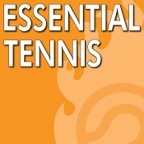

Ian Westermann
Podcast #159: Raise Your Tennis IQ



